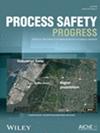Risk assessment of LNG bunkering vessel operation based on formal safety assessment method
IF 1
4区 工程技术
Q4 ENGINEERING, CHEMICAL
引用次数: 0
Abstract
With the increase of Liquefied Natural Gas (LNG) fuel-powered vessels, LNG bunkering vessels have become an important development direction of LNG bunkering technology for its advantages. However, the LNG bunkering vessel operation risk assessment is relatively few. Formal Safety Assessment (FSA) is a novel structured and systematic risk analysis method for Marine engineering, through the data analysis based on probability theory, people can foresee the risk before the accident and take measures to reduce the risk and avoid heavy loss. In this paper, the LNG bunkering vessel operation process is divided into four subprocesses: the loading process, the navigation process, the bunkering process, and the anchoring process. The FSA method is used to identify and evaluate the risks in each process, judge the negligible risk, reasonable and feasible low risk, unacceptable risk, and put forward corresponding safe measures to provide safety guarantees for the operation of LNG bunkering vessels. Through the standardized assessment steps of FSA, a risk model for the LNG bunkering vessel operation process is established, and reasonable suggestions and measures that can effectively control the risk of the LNG bunkering vessel operation process are proposed, the research results of this paper can provide important technical guidance and reference value for the safe operation of LNG bunkering vessel.基于正式安全评估方法的液化天然气加注船运营风险评估
随着液化天然气(LNG)燃料动力船舶的增加,LNG 加注船以其优势成为 LNG 加注技术的重要发展方向。然而,LNG 加注船运营风险评估却相对较少。正式安全评估(FSA)是一种新颖的结构化、系统化的海洋工程风险分析方法,通过基于概率论的数据分析,人们可以在事故发生前预见风险,并采取措施降低风险,避免重大损失。本文将 LNG 加注船的操作过程分为四个子过程:装载过程、航行过程、加注过程和锚泊过程。采用 FSA 方法对各流程中的风险进行识别和评估,判断可忽略风险、合理可行的低风险、不可接受风险,并提出相应的安全措施,为 LNG 加注船的运行提供安全保障。通过FSA的标准化评估步骤,建立了LNG加注船作业过程的风险模型,提出了能够有效控制LNG加注船作业过程风险的合理建议和措施,本文的研究成果可为LNG加注船的安全作业提供重要的技术指导和参考价值。
本文章由计算机程序翻译,如有差异,请以英文原文为准。
求助全文
约1分钟内获得全文
求助全文
来源期刊

Process Safety Progress
工程技术-工程:化工
CiteScore
2.20
自引率
10.00%
发文量
99
审稿时长
6-12 weeks
期刊介绍:
Process Safety Progress covers process safety for engineering professionals. It addresses such topics as incident investigations/case histories, hazardous chemicals management, hazardous leaks prevention, risk assessment, process hazards evaluation, industrial hygiene, fire and explosion analysis, preventive maintenance, vapor cloud dispersion, and regulatory compliance, training, education, and other areas in process safety and loss prevention, including emerging concerns like plant and/or process security. Papers from the annual Loss Prevention Symposium and other AIChE safety conferences are automatically considered for publication, but unsolicited papers, particularly those addressing process safety issues in emerging technologies and industries are encouraged and evaluated equally.
 求助内容:
求助内容: 应助结果提醒方式:
应助结果提醒方式:


